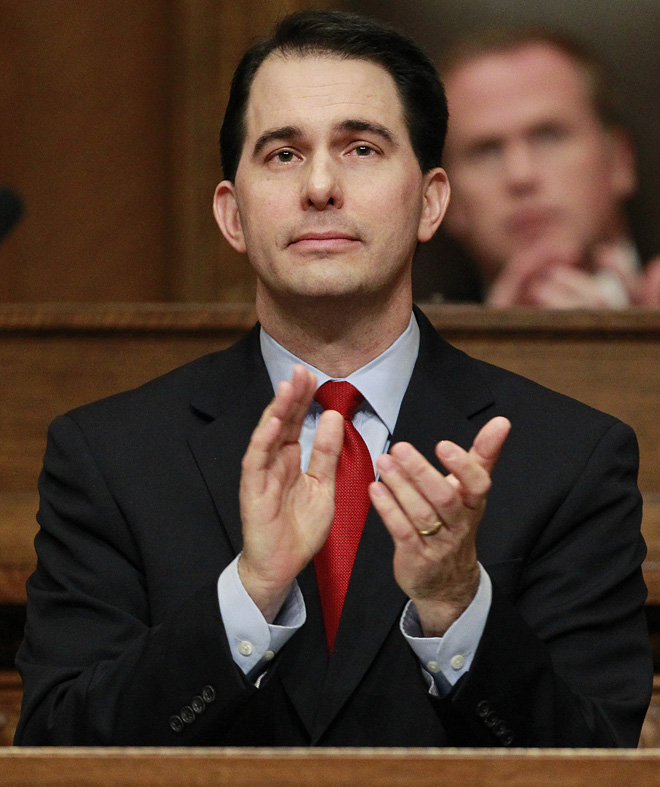Wisconsin Gov. Scott Walker’s campaign is asking a court to grant it more time — on top of a previous extension — to review and challenge the more than one-million signatures that Democrats filed last month to recall him.
Under state law, a recall target has 10 days to review signatures, starting from when petitions are filed, and then register their challenges with the state Government Accountability Board, which oversees elections.
Late last month, Dane County Judge Richard Niess granted the GAB a further 30 days, for 61 days total through March 19. Niess also granted Walker an extra 20 days, for 30 days total through February 27. (The clock was also restarted for Walker, due to the GAB’s initial inability to deliver copies of the sheer number of petitions, to begin when the copies were fully supplied.)
In the latest filing submitted on Tuesday, Walker’s legal team asks for a further extension of two weeks, up through March 12 — getting close to the GAB’s own deadline — in order to accommodate their requirements for data analysis by their contracted third-party vendor.
The filing says that the Walker campaign was able to complete a review of the petitions for clear errors such as signature problems, thanks to the labor of 3,000 volunteers. But beyond that, they say, they must also compile and analyze a full database, in order to screen for duplicate names and invalid addresses — a process that they say is “not yet 25 percent complete.”
They concede that of the amount of processing that has been done, their discovered error rate is only between 10 and 20 percent. This is consistent with the 15% figure in a random sampling by the Milwaukee Journal Sentinel, which is duly referenced in the filing.
However, the Democrats’ submission of over a million signatures was nearly twice the required threshold of just over 540,000, or 25 percent of the total number of voters in the 2010 gubernatorial election. As a result, the Walker campaign would need to disqualify nearly half of the signatures in play here — something that does not appear likely based on the analysis so far.
However, the filing says that a full review is still necessary: “While an error rate of close to 50 percent would be needed to put a recall election in doubt, the office holders still have a valid interest in filing objections and determining that a sufficient number of individually valid signatures are present. The current time frame is insufficient even for the most minimal of review.”
The filing also concludes with their legal argument:
22. At the January 25, 2012, hearing, this court said that any request for an extension of time must be balanced against the interest in a promptly scheduled recall election. The current request minimally impacts that interest. As circumstances now stand, the review periods for the Lieutenant Governor and GAB already run to mid-March. The current extension request should allow the GAB to complete matters by the end of March.
23. Failure to provide a meaningful extension of the time periods set forth in Wis. Stat. § 9.10(3)(b) would establish as a policy that recall petitions purportedly containing a large number of signatures will receive a more cursory review than recall petitions containing fewer signatures.
24. The current period set by the court is not a legally sufficient amount of time to perform a meaningful review of the recall petition and raise objections that are properly supported by evidence.
25. Good cause exists to extend the time granted Governor Walker to review the Recall Petition and submit a written challenge to GAB regarding the sufficiency of the Recall Petition. Governor Walker respectfully requests that he be allowed a period of at least two additional weeks, until March 12, 2012, to submit his written challenges.
(Filing via WisPolitics)






